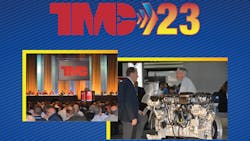TMC considers root-cause analysis at annual spring meeting
In a continuation of its comeback since returning to near-full strength in 2022, the American Trucking Associations’ Technology & Maintenance Council Annual Spring Meeting is back for 2023. After a momentous Fall ’22 meeting in Cleveland, Ohio, that saw Bonnie Greenwood make history at TMCSuperTech, 2023’s first TMC meeting will be held from Feb. 27 through March 2 at the Orange County Convention Center in Orlando, Florida.
The Annual 2023 meeting will bring back its traditional favorite events, including Fleet Talk (Feb. 27 at 4 p.m.) and Shop Talk (March 1 at 7 a.m.) alongside several educational and technical sessions, the schedule for which can be found at the TMC 23 Annual Meeting site.
“The essential elements of TMC are the same, [there’s just] more of it,” said Robert Braswell, TMC executive director. He’s correct that once again, the meeting will be hosting 110 different task forces under 17 different study groups within the event’s three-day period, not to mention over 150 meetings and sessions and the 500,000-sq.-ft. trade show.
This year, the trade show itself will feature a pavilion examining sustainability and automated vehicles as an extension to the expo’s subjects the year prior, including a “ride and drive” dimension alongside technology focused on cybersecurity, automated driving, advanced driver assistance systems (ADAS), and alternatively powered vehicles.
With over 5,100 attendees and 380 exhibitors, “We're getting back to our regular, pre-COVID numbers that we [had] in 2020,” Braswell explained.
This leaves the meeting free to dive headlong into the many groups and meetings surrounding its theme this year: “Advancing Reliability Through Root Cause Analysis.” Any technician or shop manager worth his salt is already familiar with root cause analysis in terms of telematics and diagnostic trouble codes, but for 2023, TMC wants to examine how this investigative process applies to industry facets outside the shop, too.
“The theme is derived from an overarching [idea] that our general chairman and treasurer for this year, Randy Obermeyer with OnLine Transport, is trying to promote, which is using root cause analysis and making maintenance and equipment decisions,” Braswell explained.
This is particularly pertinent as the importance and accessibility of fleet data, from over-the-air asset monitoring to shop-management software and connected trailers, has grown rapidly throughout the past several years. But there can be too much of a good thing, as some fleets may struggle with data overload from the sheer amount of information available to them.
“The main driving force [behind 2023’s theme] has been Randy wanting to apply these techniques to TMC processes,” Braswell asserted. “Part of the problem, quite frankly, is that you have telematics and then you have all these fleets [with] all this data… and they have no idea what it is. So, having this capability doesn't mean you're applying root cause analysis at all. In fact, most of the fleets tell us it's like drinking from a firehose: We have we have tons of data and no information.”
As a result, several of 2023’s task forces are examining the applicability of root cause analysis in various facets of the commercial vehicle industry, even beyond the Root Cause Analysis strategy task force within the Fleet Maintenance Management study group.
“The bottom line is taking a methodical approach to try to solve problems rather than just being reactive to a problem,” Braswell asserted.
Beyond these technical sessions, TMC’s 2023 meeting will feature Travis Mills at the kickoff breakfast on Feb. 28 and two awards ceremonies, one on March 1 at 12:45 p.m. and another later that evening at 6:30 p.m.
Electrification and automation
Strategies for better understanding the difficulties facing fleets today and how to solve them will be held throughout the event, including several technical sessions. The first of these, the keynote session, is “Powertrains of the Future!” (Feb. 28, 8:30 a.m.) and will discuss the big questions surrounding electric and automated vehicles.
“A lot of fleets are saying, ‘Look, everybody's talking about decarbonization, but 18 months is coming up real fast,’” Braswell explained. “And that's when all this [electrification] stuff is expected to hit… We have no idea how to how to specify electric vehicles, how to how to purchase electric vehicles, [or] get them integrated into our communities where the utilities say ‘You want 100 electric vehicles? We don't have enough power to generate those electric vehicles because we have all these other requests, plus we have to light houses and heat homes.’”
The session will also examine the future power source of electrification, including the viability of battery electric, hybrid hydrogen, hydrogen internal combustion engines, and biofuels.
Meanwhile, a separate task force will explore the growth of automated vehicles and the many insurance pitfalls that could surround these assets as they are more widely adopted.
“How do you insure these vehicles?” Braswell asked. “Who's responsible? Is the fleet going to be responsible for the vehicle? Are they going to own the vehicle if they don't have a driver? Why should we be responsible for the vehicle, or is it the service provider or the manufacturer that needs to ensure the vehicles? [There’s] a lot of questions about that, especially when you get higher and higher levels of automation.”
Analyzing root cause issues
Later educational sessions, such as “Root Cause Analysis: From the Shop to the Supply Chain,” (March 2, 9:45 a.m.), will also focus on root cause analysis applications from technicians and tools on the shop floor to the supply chain.
“Whether it's chip shortages or labor issues, some fleets do better than others with responding to these kinds of challenges,” Braswell discussed. “And often it's because they apply root cause analysis to it. So, for example, if you're short on a particular part, why are you short on that part? Maybe you can spec your vehicles a different way. Maybe you can work with your vendors and service providers a different way.”
Other study groups will encompass topics from aftermarket brake lines to the standardization of telematics providers, all of which are meant to streamline solutions for fleets.
Circling back to understanding issues at their source to better address them, Wednesday’s S.3 Study Group Session will focus on how fleets cope with aging assets and a struggling supply chain.
“[Fleet’s might say] 'Root cause analysis is great, but I'm hosed right now,’” Braswell hypothesized. “So, how's that going to affect my equipment life?’… Then what do you do? How do you address keeping the vehicle maintained? Maybe you're doing more rebuilding now instead of just buying a new part or replacement part for it and swapping it out.”
About the Author

Alex Keenan
Alex Keenan is an Associate Editor for Fleet Maintenance magazine. She has written on a variety of topics for the past several years and recently joined the transportation industry, reviewing content covering technician challenges and breaking industry news. She holds a bachelor's degree in English from Colorado State University in Fort Collins, Colorado.
